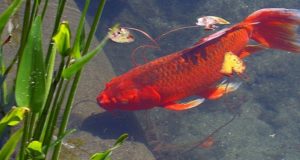Some of the things that the scientific community is “discovering” are things that have been known for years by reef hobbyists. I’ve been reading through some articles about recently published studies. A couple of them really got my attention as things that many hobbyist already know, just from keeping aquariums in their homes.
Distressing Damsels
 Ask a long time reef aquarist about keeping damselfish in a reef aquarium…they will probably tell you that damsels are aggressive, and sometimes destructive to a reef aquarium community. A study recently published on PLoSONE.org found that Threespot Damselfish are damaging coral reefs in their efforts to find new habitat.
Ask a long time reef aquarist about keeping damselfish in a reef aquarium…they will probably tell you that damsels are aggressive, and sometimes destructive to a reef aquarium community. A study recently published on PLoSONE.org found that Threespot Damselfish are damaging coral reefs in their efforts to find new habitat.
The damsel’s natural habitat on the reef is within the branchy, highly structured Staghorn Coral colonies, Acropora cervicornis, that once dominated the Caribbean reef landscape. Since the 1970s, the Staghorn Coral populations have been decimated in much of the Carribean, and the damsels now inhabit other coral types. This study showed that in the absence of the Staghorn thickets, the damsels have turned to some of the slower growing, massive corals for habitat, primarily Montastrea species. The damsels were also witnessed destroying patches of live coral, to encourage algae growth as a food source. These algae gardens are vigorously defended by the damsels, and as a result the whole structure of the reef habitat is being altered by these little fish.
Damsels are bold and territorial fish. The only thing that has ever attacked me in the ocean is a damselfish, and it has happened more than once. As a SCUBA diver, I am often asked about sharks, barracuda and other predators, and whether or not I am afraid of being attacked by them while diving…Personally, I am not afraid of sharks, but if damsels were bigger, I might never go in the ocean again. They are aggressive little fish which will relentlessly attack anything that invades their space, no matter how much bigger you are.
Helpful Herbivores
 The other publication that caught my attention was a study by a group led by Terry Hughes of James Cook University in Australia which showed that Plant-grazing Fish Boost the Resilience of Coral Reefs Facing Stress. Through the use of cages, that excluded larger fish from sections of reef, the study looked at coral recovery from bleaching events, with and without herbivorous fish present during recovery. What the research showed was that fish grazing played a major role in a reefs ability to control algal growth, and recruit new corals into a given area. Reef areas that had the exclusionary cages showed decreased recruitment of new corals, and damaged areas became overgrown with plant material much more so than the reefs with herbivorous fish present.
The other publication that caught my attention was a study by a group led by Terry Hughes of James Cook University in Australia which showed that Plant-grazing Fish Boost the Resilience of Coral Reefs Facing Stress. Through the use of cages, that excluded larger fish from sections of reef, the study looked at coral recovery from bleaching events, with and without herbivorous fish present during recovery. What the research showed was that fish grazing played a major role in a reefs ability to control algal growth, and recruit new corals into a given area. Reef areas that had the exclusionary cages showed decreased recruitment of new corals, and damaged areas became overgrown with plant material much more so than the reefs with herbivorous fish present.
HMMMM, be careful with damsels, and keep herbivores in your reef tank, what amazing concepts. I hope that these studies did not cost too much money to conduct; reef hobbyists have known these principles for years.
Until next blog,
Dave
 That Fish Blog – Aquarium Advice and Information
That Fish Blog – Aquarium Advice and Information


It’s great to see posts like this. It will surely help those fish hobbyists who have their own tropical freshwater aquarium. We cannot always assume that everyone knows everything. It really helps to learn each and every day. Just my two cents.:)